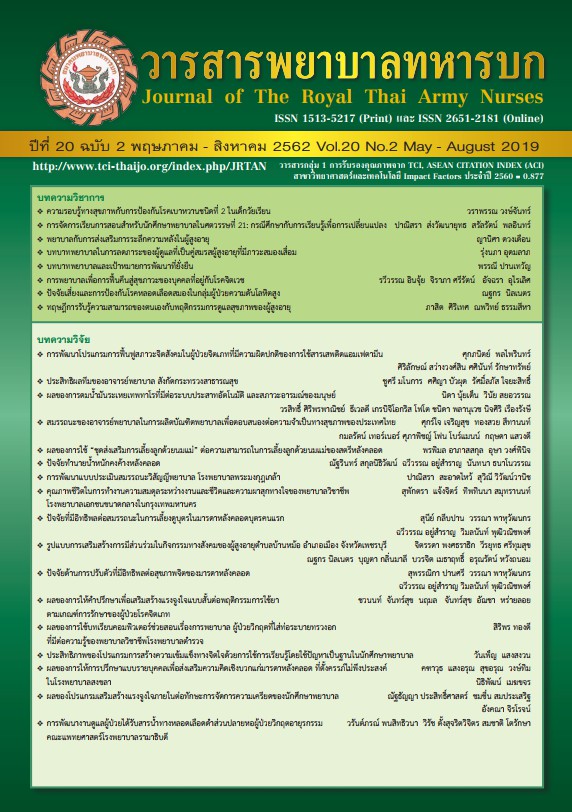The Effectiveness of Resilience Enhancement Program by using Problem - based Learning in Undergraduate Nursing Students
Keywords:
resilience enhancement program, nursing student, problem - based LearningAbstract
The quasi-experimental research aimed to examine the effectiveness of resilience enhancement program by using problem - based learning in undergraduate nursing students. The samples of this study were divided into 2 groups. The experimental group consisted of 30 nursing students. The control group consisted of 30 nursing students. Both groups were selected by simple random sampling. The research instrument were 1) The Resilience Enhancement Program 2) Resilience questionnaire. Cronbach’s alpha coefficient of the resilience questionnaire was 0.96. Data were analyzed by descriptive statistics, pair t-test and Independent t-test. The findings indicated that 1) the resilience mean score of the experimental group after receiving the resilience enhancement program was significantly different higher than before at .01 level. 2) After implementing the program, the experimental group was significantly different than control group at .01 level.
Downloads
References
2. Chen JY. Problem-based learning: Developing resilience in nursing Students. Kaohsiung Journal of Medical Sciences 2011; 27(6): 230-233.
3. Thomas LJ, Revell SH. Resilience in nursing students: An integrative review. Nurse Education Today. 2016;36:457-462.
4. Aburn G, Gott M, Hoare K. What is resilience? An Integrative Review of the empirical literature. Journal of Advanced Nursing. 2016; 72(5):980-999.
5. Hamdan AR, Kwan CL, Khan A, Ghafar MNA, Sihes AJ. Implementation of Problem Based Learning among Nursing Students. International Education Studies. 2014; 7(7); 136-142.
6. Thomas LJ, Asselin M. Promoting resilience among nursing students in clinical education. Nurse Education in Practice. 2018; 28: 231-234.
7. Yilmaz EB. Resilience as a strategy for struggling against challenges related to the nursing profession. Chinese Nursing Research. 2017; 4:9-13.
8. Sirisupluxana P. Teaching Nursing Students to Develop Critical Thinking Skills. The Journal of Boromarajonani College of Nursing. 2013; 19(2):5-19. (in Thai).
9. Boardman L. Building Resilience in Nursing Students: Implementing Techniques to Foster Success. International. Journal of Emergency Mental Health and Human Resilience. 2016; 18(3):1-5.
10. Kaiwikaikosol A, Anutat S, Nintachan P. The effect of resilience enhancing program on depression of nursing students at a nursing college. The journal of Psychiatric Nursing and Mental Health. 2014; 29: 27-43. (in Thai).
11. Chitrak W, Nintachan P, Taweekoon T. The effect of the resilience enhancing program on depression and resilience of nursing students in nursing college in the northeast region of Thailand. The journal of Psychiatric Nursing and Mental Health. 2015; 29(3):42-60. (in Thai).
12. Kaiwikaikosol A, Anutat S, Nintachan P. The effect of resilience enhancing program on depression of nursing students at a nursing college. The journal of Psychiatric Nursing and Mental Health. 2014; 29: 27-43. (in Thai).
13. Chitrak W, Nintachan P, Taweekoon T. The effect of the resilience enhancing program on depression and resilience of nursing students in nursing college in the northeast region of Thailand. The journal of Psychiatric Nursing and Mental Health. 2015; 29(3):42-60. (in Thai).
14. Thomas LJ, Revell SH. Resilience in nursing students: An integrative review. Nurse Education Today. 2016;36:457-462.
15. Tantipiwatakul P. A Guide for Strengthening the Mind for Health Personnel. Nonthaburi: Agricultural Cooperative Federation of Thailand Co., Ltd; 2007. (in Thai).
16. Prakai C, editors. Nursing Research: Concept Principle and Practice. 2nded. Nonthaburi: Praboromarajchanok Institute; 2013. (in Thai).
17. Pungthum U, editors. Mental Health Enrichment Guide for Educational Institutions. Nonthaburi. Department of Mental Health. Ministry of Public Health; 2009. (in Thai).
18. Chmitorz et al. Intervention studies to foster resilience. A systematic review and proposal for a resilience framework in future intervention studies. Clinical Psychology Review. 2018; 59: 78–100.
19. Arayathanitkul B, Sawekngam W, Chuchat A. Development of an Instructional Model based on Character Education and Experiential Learning Approaches for Enhancing Cultural Competences in Nursing of Nursing Students. Journal of The Royal Thai Army Nurses. 2017; 18(3):51-61. (in Thai).
20. Wongsaree, C. Teaching of Critical thinking in Generation Z Nursing Studeut: A Review of Literature. Journal of The Royal Thai Army Nurses. 2019;20(1):21-30 (in Thai).
Downloads
Published
How to Cite
Issue
Section
License
บทความหรือข้อคิดเห็นใดใดที่ปรากฏในวารสารพยาบาลทหารบกเป็นวรรณกรรมของผู้เขียน ซึ่งบรรณาธิการหรือสมาคมพยาบาลทหารบก ไม่จำเป็นต้องเห็นด้วย
บทความที่ได้รับการตีพิมพ์เป็นลิขสิทธิ์ของวารสารพยาบาลทหารบก
The ideas and opinions expressed in the Journal of The Royal Thai Army Nurses are those of the authors and not necessarily those
of the editor or Royal Thai Army Nurses Association.






